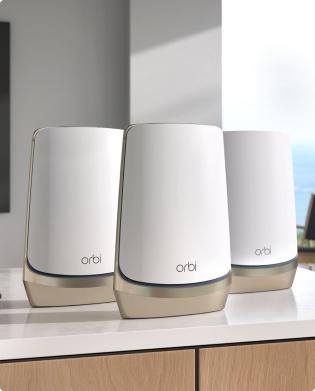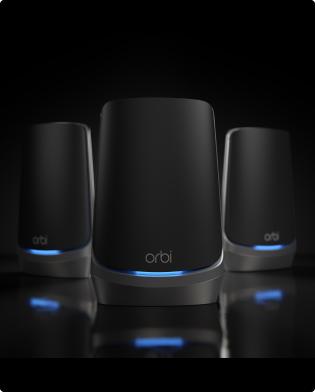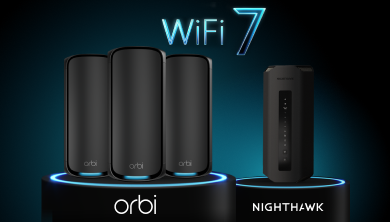
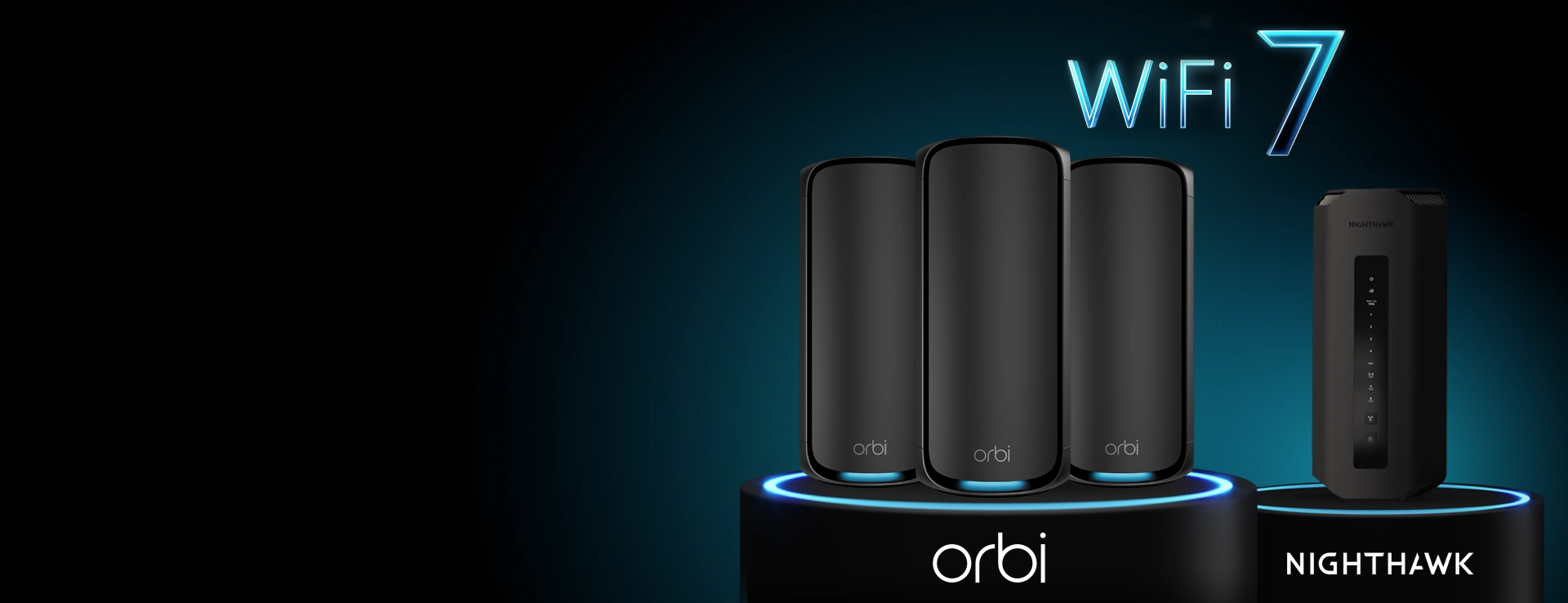
What is WiFi 7?
MAKING MULTI-GIGABIT SPEEDS FOR YOUR ENTIRE HOME A REALITY.
Today's multi-gigabit internet plans are quickly outpacing current WiFi technology. WiFi 7, also known as IEEE 802.11be, will represent a revolutionary change. The new standard, dubbed EHT for Extremely High Throughput, will finally make true multi-gigabit WiFi throughout the home a reality with faster speeds, less interference, and better performance for today's many high-bandwidth online activities.
WiFi 7 key features and benefits

5x faster speeds
than WiFi 6E
WiFi 7 increases maximum speeds from 9.6Gbps to a stunning 46Gbps, so you can take full advantage of today’s ultra-fast internet plans with gigabit-plus performance on your devices.

2x maximum bandwidth
320MHz high-capacity channels
New, ultra-wide bandwidth means double the speed to your devices. WiFi 7 smart phones can get speeds up to 5Gbps. This opens up exciting new possibilities for AR and VR applications. 1.2GHz spectrum in 6GHz band makes 320MHz ultra-wide band possible and also allows for more routers to operate in congested neighborhood without stepping on each other.

Significantly lower latency
for real-time responsiveness
Latency has a noticeable effect on real-time activities like gaming and video conferencing. WiFi 7 dramatically upgrades current gen experiences and opens the door for immersive next gen AR and VR.
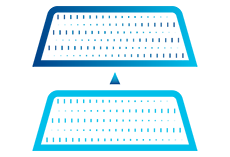
20% more data transmission
with 4096 QAM modulation
Modulation, simply put, is the process of converting data into WiFi radio waves. A jump from 10-bit to 12-bit data modulation packs in 20% more data at a time for crystal-clear video streaming, Zoom calls and more.
What new innovations come with WiFi 7?


MULTI-LINK OPERATION
The power of two
WiFi 7 taps both 6GHz and 5GHz WiFi bands at once to avoid network traffic and keep you connected if you move out of range of one band. This feature, called multi-link operation, also enables devices to simultaneously send and receive data across both WiFi bands, increasing throughput.
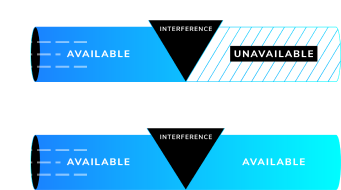

PREAMBLE PUNCTURING
Outsmart WiFi interference
Did you know your neighbors' WiFi might be slowing your network down? With previous versions of WiFi, any channels with interference become unavailable. Preamble puncturing allows your WiFi to slice off part of a channel to transmit your data, if the interference isn’t occupying the entire channel, greatly reducing network congestion.
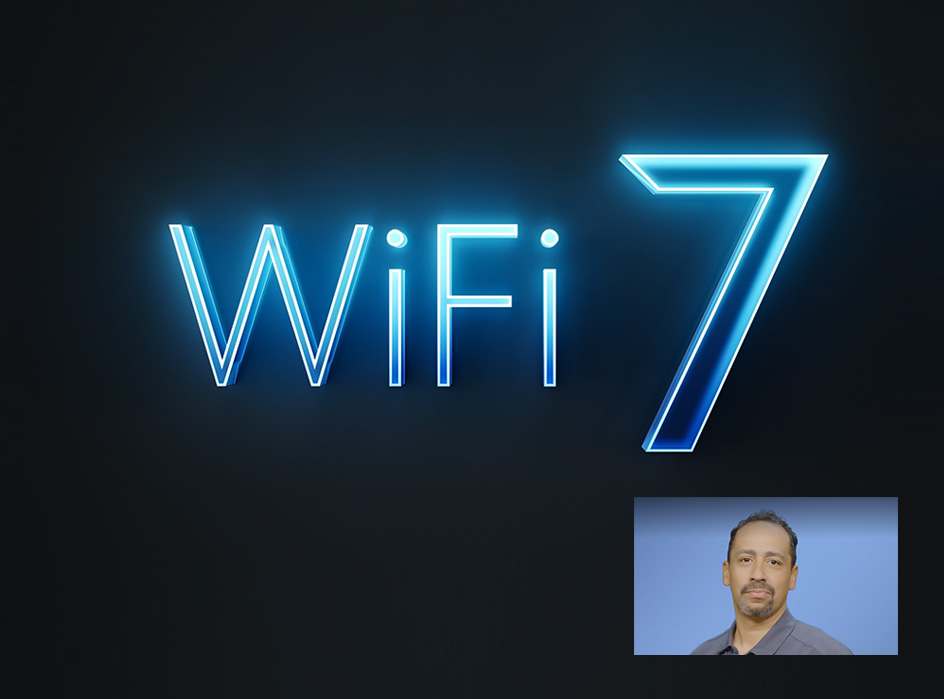

Why is NETGEAR the leader in WiFi 7?
NETGEAR is the proven leader in WiFi, with over 25 years of experience building the world’s best networking devices. When it comes to WiFi 7, our diverse experience across home, business, mesh, and mobile 5G networking gives us a unique and deep understanding of the technologies used. If you’re looking for a router or whole home mesh system that can deliver all WiFi 7 has to offer, look no further than NETGEAR.
See the difference between WiFi 7 and earlier generations in the chart below
Read the full article for a detailed comparison between WiFi 6 and WiFi 7.
WiFi 5 |
WiFi 6 |
WiFi 6E |
WiFi 7 |
|
|---|---|---|---|---|
|
Introduced |
Introduced 2013 |
Introduced 2019 |
Introduced 2021 |
Introduced 2024 |
|
IEEE Standard |
IEEE Standard 802.11ac |
IEEE Standard 802.11ax |
IEEE Standard 802.11ax |
IEEE Standard 802.11be |
|
Max Speed |
Max Speed 3.5 Gbps |
Max Speed 9.6 Gbps |
Max Speed 9.6 Gbps |
Max Speed 46 Gbps |
|
Bands |
Bands 2.4 GHz, 5 GHz |
Bands 2.4 GHz, 5 GHz |
Bands 6 GHz |
Bands 2.4 GHz, 5 GHz, and 6 GHz |
|
Multi-Link Operation |
Multi-Link Operation No |
Multi-Link Operation No |
Multi-Link Operation No |
Multi-Link Operation Yes |
|
Security |
Security WPA 2 |
Security WPA 3 |
Security WPA 3 |
Security WPA 3 |
|
Channel size |
Channel size 20, 40, 80, 80+80, 160 MHz |
Channel size 20, 40, 80, 80+80, 160 MHz |
Channel size 20, 40, 80, 80+80, 160 MHz |
Channel size 20, 40, 80, 80+80, 160MHz, 320MHz |
|
Modulation |
Modulation 256-QAM-OFDMA |
Modulation 1024-QAM-OFDMA |
Modulation 1024-QAM-OFDMA |
Modulation 4096-QAM OFDMA |
|
MIMO |
MIMO 4X4 MIMO, DL MU-MIMO |
MIMO 8X8 UL/D/ MU-MIMO |
MIMO 8X8 UL/D/ MU-MIMO |
MIMO 16X16 MU-MIMO |
Who will benefit the most from WiFi 7?
WiFi 7 advantages for entertainment
WiFi 7 will open new doors for home entertainment. With improved bandwidth and speed, a household can easily stream 4K and 8K content at once throughout the home, host Twitch streams, game in VR, work on Zoom calls, and browse the web without issue.
Even more exciting is the next generation of AR and VR content. WiFi 7 unleashes a world of possibilities to explore new virtual worlds with fully interactive content. With ultra-high speeds and imperceptible levels of latency, users can immerse themselves in these worlds with life-like responsiveness.

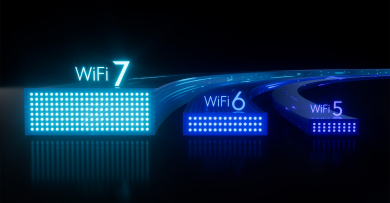
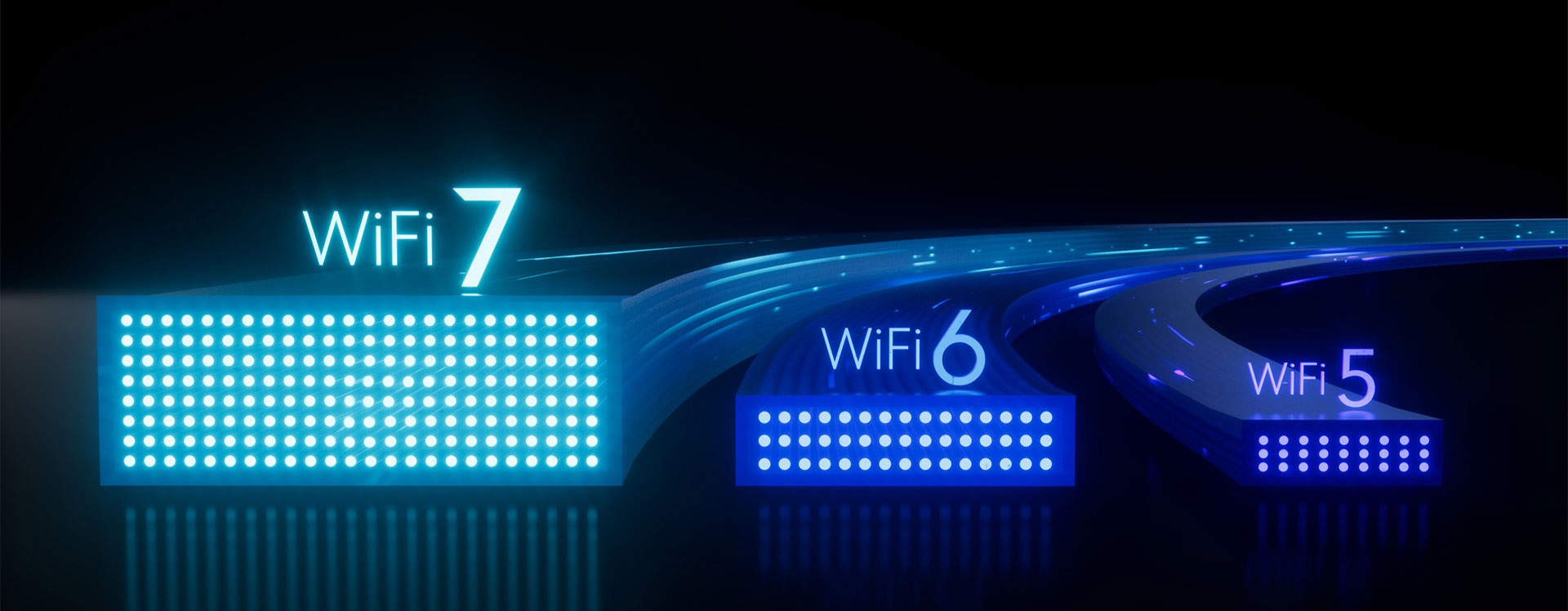
WiFi 7, the most powerful WiFi ever

WiFi 7 advantages for gamers
WiFi 7 will be massive for gamers. Gamers will experience a huge drop in latency, removing the annoying lag issues that hamper the online gaming experience. Games will download in a fraction of the time and streamed content for cloud-based games will render faster and clearer than ever before.
WiFi 7 will also open up many new possibilities in the realm of AR and VR gaming, allowing users to stream ultra-high-definition content seamlessly with real-time responsiveness.
WiFi 7 advantages for home
WiFi 7 will bring immediate improvements for today’s smart homes. The rise of remote work and learning has taxed the abilities of current WiFi technology, as data-intensive Zoom calls and video streaming compete for bandwidth.
With WiFi 7, you can say goodbye to the days of glitchy video conferencing streams, slow downloads, and long buffering times. WiFi 7 offers more speed, bandwidth and an improved ability to handle many devices at once, unlocking the smart home of the future.
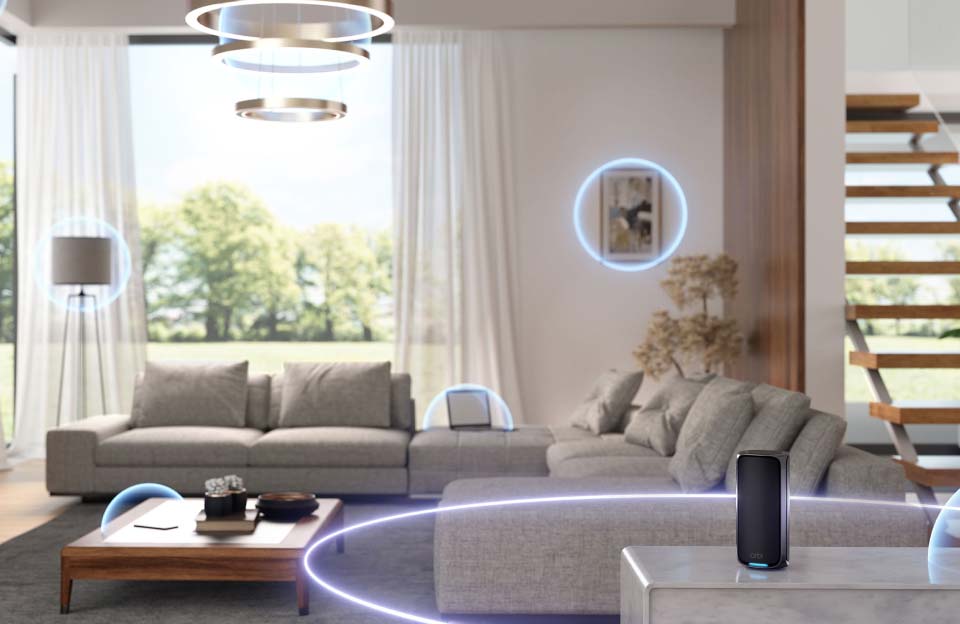
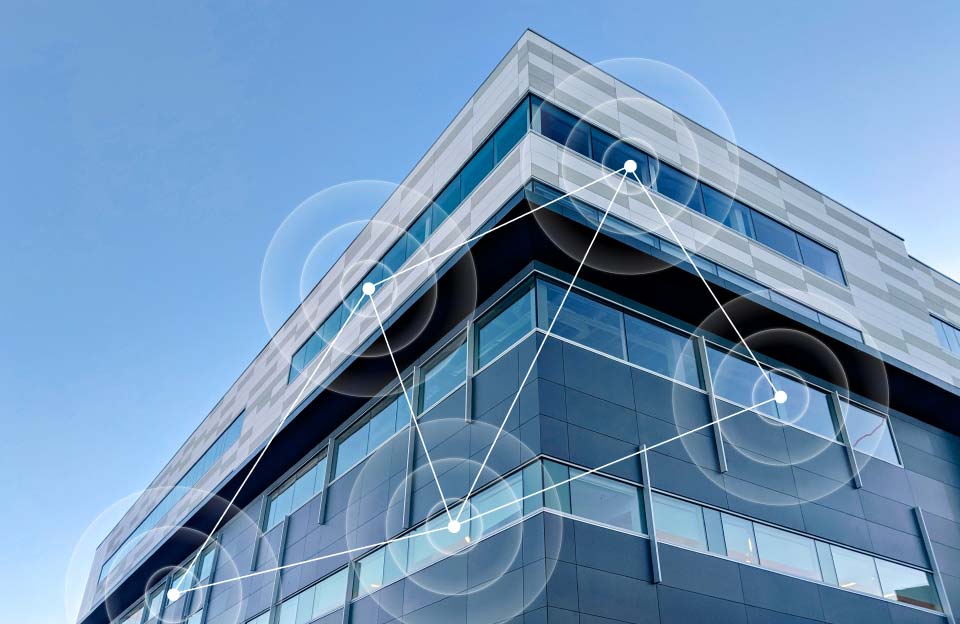
WiFi 7 access points for business
WiFi 7 for business will unlock many new capabilities. Users will experience noticeable performance improvements on shared office networks thanks to improved speed, bandwidth, and new features like multi-link operation.
WiFi 7 access points will unlock intriguing capabilities for incorporating AR and VR into the workplace, enabling next-gen hardware like goggles with AR-enhanced heads-up displays, robust IoT-enhanced smart office products, and further-improved workplace automation technologies.
WiFi 7 FAQ
Yes, WiFi 7 is fully backward compatible. However, different generations of user devices will reap different levels of benefit. For example, only WiFi 6E and WiFi 7 devices will be able to use the ultra-fast 6GHz WiFi band. Similarly, only the newest WiFi 7 devices will be able to take advantage of advanced features like the 320MHz bandwidth and multi-link output.
With higher speed and lower interference you will see overall improvement in coverage, particularly as applications demanding higher speeds become available. With technological advancements such as multi-link output you will see improvement in WiFi performance and seamless roaming across mesh networks and over coverage areas of any size. In simple terms, users can easily customize their WiFi 7 coverage area by using a mesh router and satellites to expand range, as needed.
WiFi 7 will be about 5X faster vs. WiFi 6E and WiFi 6. Top theoretical speeds will improve from 9.6Gbps to 46Gbps. However actual speeds will be dependent on the number of streams supported, speed from the internet service provider, data plan, networking hardware, and network traffic.
It depends. Your current router and modem may be holding back your performance, particularly if you are on an older version of WiFi. WiFi 7 products likely won’t be available until mid 2023, so if you are unsatisfied with your WiFi performance, there is still time to enjoy an upgrade to the current WiFi standard. Check out the following links to learn more about the WiFi 6 and WiFi 6E.
No. With current internet service provider speeds and many high-quality hardware options available, there is still a substantial amount of time available to enjoy the benefits of WiFi 6 before you can truly experience all the benefits WiFi 7 has to offer.
WiFi 7 will offer significant improvements to speed and bandwidth, along with a host of underlying technological improvements designed to make your WiFi work smarter and more efficiently. These benefits are outlined in the article above.
The first WiFi 7 products are expected to become available as early as mid 2023, with wider market adoption expected to take hold in late 2024 and beyond.
